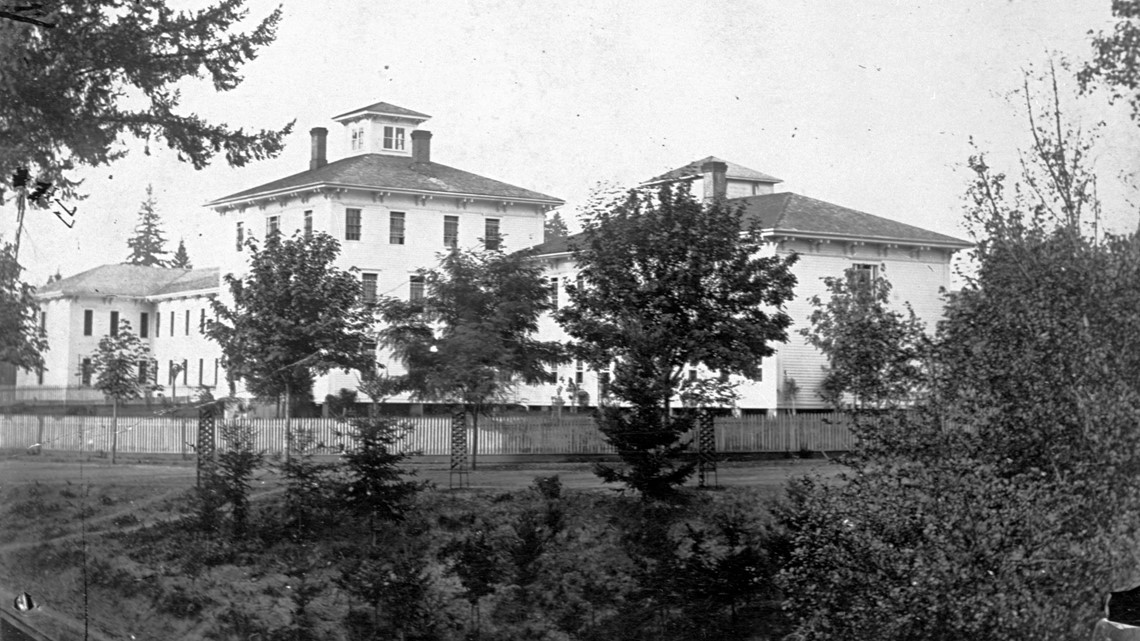CLACKAMAS, Ore. — Listen to Wicked West on Apple Podcasts, Spotify, Amazon Music and Stitcher.
Editor’s note: This story contains graphic depictions of violence.
In May of 1854, the Lamb family gathered around the dinner table in their small log cabin. The family, who had lived in North Carolina, had settled in Clackamas in the new Oregon Territory following a brutal six-month expedition on the Oregon Trail.
Nathaniel Lamb sat at the head of the table, surrounded by his children. As they ate supper, Nathaniel boasted about his successful hunt earlier in the day. He had shot a bear, which would provide enough meat to last his family of six for some time.
As he shared the tale of his hunt, his wife Charity rocked their newborn baby in her arms. The couple’s three oldest children listened with such fascination that no one noticed Charity quietly slip outside the front door.
She returned inside, with her infant son in one arm and an ax in the other. As Nathaniel carried on with his story, Charity raised the ax high over his head and slammed it into the back of his skull. She raised the ax once more and delivered the final blow into his head.
Nathaniel lived for almost a week after the attack. He died from his injuries on May 20, 1854 at about the age of 34. While he was on his death bed, he told authorities what had happened.
Charity was taken into custody and charged with first-degree murder, which carried a penalty of death.
“She was the first woman ever in Oregon Territory, charged with murder and would be the first woman tried for murder,” said Kerry Tymchuk, the executive director of the Oregon Historical Society.
Charity’s murder trial in Oregon lasted about six days. The prosecutor alleged that Charity had been having an affair with an older man and he argued that she wanted Nathaniel out of the picture.
“Some thought perhaps because a man had been in town recently living nearby from California. There was talk that he had developed a romantic interest in both Charity and Mary Ann, her 19-year-old daughter, in that both were interested in him romantically,” said Tymchuk.


Charity’s attorneys argued that Nathaniel was abusive and she feared for her life. However, the issue of domestic violence was not addressed by society at the time and women held little to no rights in the 1850s.
News of a wife murdering her husband with an ax in front of young children was a shocking story for residents. Newspapers splashed Charity’s name across the front pages using words like “monster,” “inhumane” and “cold-blooded” in bold print.
The jury returned a guilty verdict, but the judge spared Charity the death penalty and sentenced her to life in prison.
“Charity, as a woman, was assigned to laundry duty,” Tymchuk said. “She did the laundry for the other inmates. She did the laundry for the Warden’s family.”
She was in prison for eight years before she was placed in a mental asylum.


“[Charity] never really apologized. You could tell, as time went on, that she may have been losing touch with reality,” said Tymchuk. “But sometimes she denied it, sometimes admitted it, but never really apologized for it.”
Charity Lamb, nicknamed Oregon’s “first convicted murderess,” lived in the asylum for 15 years until she died in 1879. She was about 65 years old.
To learn more about Charity Lamb and other Oregon history, visit the Oregon Historical Society's website.
New episodes of Wicked West drop every Wednesday. Listen on your favorite podcast apps including: Apple Podcasts, Spotify, Amazon Music and Stitcher.

